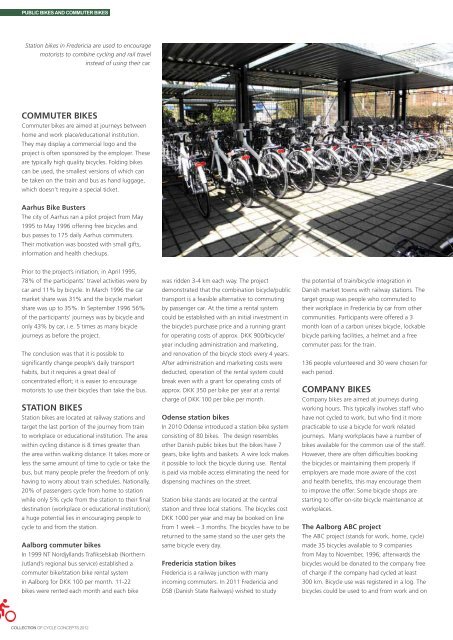Collection of Cycle Concepts 2012.pdf - Fietsberaad
Collection of Cycle Concepts 2012.pdf - Fietsberaad
Collection of Cycle Concepts 2012.pdf - Fietsberaad
Create successful ePaper yourself
Turn your PDF publications into a flip-book with our unique Google optimized e-Paper software.
PUBLIC BIKES AND COMMUTER BIKES<br />
Station bikes in Fredericia are used to encourage<br />
motorists to combine cycling and rail travel<br />
instead <strong>of</strong> using their car.<br />
COMMUTER BIKES<br />
Commuter bikes are aimed at journeys between<br />
home and work place/educational institution.<br />
They may display a commercial logo and the<br />
project is <strong>of</strong>ten sponsored by the employer. These<br />
are typically high quality bicycles. Folding bikes<br />
can be used, the smallest versions <strong>of</strong> which can<br />
be taken on the train and bus as hand luggage,<br />
which doesn’t require a special ticket.<br />
Aarhus Bike Busters<br />
The city <strong>of</strong> Aarhus ran a pilot project from May<br />
1995 to May 1996 <strong>of</strong>fering free bicycles and<br />
bus passes to 175 daily Aarhus commuters.<br />
Their motivation was boosted with small gifts,<br />
information and health checkups.<br />
Prior to the project’s initiation, in April 1995,<br />
78% <strong>of</strong> the participants’ travel activities were by<br />
car and 11% by bicycle. In March 1996 the car<br />
market share was 31% and the bicycle market<br />
share was up to 35%. In September 1996 56%<br />
<strong>of</strong> the participants’ journeys was by bicycle and<br />
only 43% by car, i.e. 5 times as many bicycle<br />
journeys as before the project.<br />
The conclusion was that it is possible to<br />
significantly change people’s daily transport<br />
habits, but it requires a great deal <strong>of</strong><br />
concentrated effort; it is easier to encourage<br />
motorists to use their bicycles than take the bus.<br />
STATION BIKES<br />
Station bikes are located at railway stations and<br />
target the last portion <strong>of</strong> the journey from train<br />
to workplace or educational institution. The area<br />
within cycling distance is 8 times greater than<br />
the area within walking distance. It takes more or<br />
less the same amount <strong>of</strong> time to cycle or take the<br />
bus, but many people prefer the freedom <strong>of</strong> only<br />
having to worry about train schedules. Nationally,<br />
20% <strong>of</strong> passengers cycle from home to station<br />
while only 5% cycle from the station to their final<br />
destination (workplace or educational institution);<br />
a huge potential lies in encouraging people to<br />
cycle to and from the station.<br />
Aalborg commuter bikes<br />
In 1999 NT Nordjyllands Trafikselskab (Northern<br />
Jutland’s regional bus service) established a<br />
commuter bike/station bike rental system<br />
in Aalborg for DKK 100 per month. 11-22<br />
bikes were rented each month and each bike<br />
was ridden 3-4 km each way. The project<br />
demonstrated that the combination bicycle/public<br />
transport is a feasible alternative to commuting<br />
by passenger car. At the time a rental system<br />
could be established with an initial investment in<br />
the bicycle’s purchase price and a running grant<br />
for operating costs <strong>of</strong> approx. DKK 900/bicycle/<br />
year including administration and marketing,<br />
and renovation <strong>of</strong> the bicycle stock every 4 years.<br />
After administration and marketing costs were<br />
deducted, operation <strong>of</strong> the rental system could<br />
break even with a grant for operating costs <strong>of</strong><br />
approx. DKK 350 per bike per year at a rental<br />
charge <strong>of</strong> DKK 100 per bike per month.<br />
Odense station bikes<br />
In 2010 Odense introduced a station bike system<br />
consisting <strong>of</strong> 80 bikes. The design resembles<br />
other Danish public bikes but the bikes have 7<br />
gears, bike lights and baskets. A wire lock makes<br />
it possible to lock the bicycle during use. Rental<br />
is paid via mobile access eliminating the need for<br />
dispensing machines on the street.<br />
Station bike stands are located at the central<br />
station and three local stations. The bicycles cost<br />
DKK 1000 per year and may be booked on line<br />
from 1 week – 3 months. The bicycles have to be<br />
returned to the same stand so the user gets the<br />
same bicycle every day.<br />
Fredericia station bikes<br />
Fredericia is a railway junction with many<br />
incoming commuters. In 2011 Fredericia and<br />
DSB (Danish State Railways) wished to study<br />
the potential <strong>of</strong> train/bicycle integration in<br />
Danish market towns with railway stations. The<br />
target group was people who commuted to<br />
their workplace in Fredericia by car from other<br />
communities. Participants were <strong>of</strong>fered a 3<br />
month loan <strong>of</strong> a carbon unisex bicycle, lockable<br />
bicycle parking facilities, a helmet and a free<br />
commuter pass for the train.<br />
136 people volunteered and 30 were chosen for<br />
each period.<br />
COMPANY BIKES<br />
Company bikes are aimed at journeys during<br />
working hours. This typically involves staff who<br />
have not cycled to work, but who find it more<br />
practicable to use a bicycle for work related<br />
journeys. Many workplaces have a number <strong>of</strong><br />
bikes available for the common use <strong>of</strong> the staff.<br />
However, there are <strong>of</strong>ten difficulties booking<br />
the bicycles or maintaining them properly. If<br />
employers are made more aware <strong>of</strong> the cost<br />
and health benefits, this may encourage them<br />
to improve the <strong>of</strong>fer. Some bicycle shops are<br />
starting to <strong>of</strong>fer on-site bicycle maintenance at<br />
workplaces.<br />
The Aalborg ABC project<br />
The ABC project (stands for work, home, cycle)<br />
made 35 bicycles available to 9 companies<br />
from May to November, 1996; afterwards the<br />
bicycles would be donated to the company free<br />
<strong>of</strong> charge if the company had cycled at least<br />
300 km. Bicycle use was registered in a log. The<br />
bicycles could be used to and from work and on



